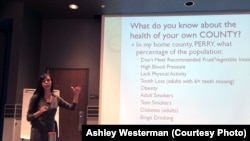As the coal mining industry declines in the Appalachian Mountain state of Kentucky, officials are trying to find something to fill the void. Some regional experts and policy makers see the health care industry as a jumping off point to their next economic boon.
Dr. Nikki Stone, a dentist, is leading a group focused on how to improve accessibility to health care. It's part of a larger effort called Shaping Our Appalachia Region initiative (SOAR). Stone said health care is actually the number one industry in the region.
“But it is kind of a paradox because at the same time ... we also have some of the poorest health measures in the nation,” she said.
Stone, a ninth-generation eastern Kentuckian, said reconciling those two facts will be the key to finding the appropriate solutions for the people and culture of the region.
Kentucky’s Fifth Congressional District encompasses most of eastern Kentucky and ranks dead last in the United States for wellbeing, according to a study released this year by Gallup.
Not only is eastern Kentucky one of the least populated and poorest regions in America, but the Kentucky Department for Public Health reports it has a greater prevalence of heart disease (84 percent higher), diabetes (47 percent higher) and obesity (26 percent higher). And Perry County is said to have the shortest life expectancy for women in the United States.
“We have some real health care issues to deal with. Any change in that system has almost got to be an improvement,” said Dee Davis , director of the Institute for Rural Strategies
He said the new health care law, the Affordable Care Act, has insured half a million Kentuckians and the region could start moving away from the fee-for-services model.
Fee-for-service means paying for health care as you get sick, as opposed to paying for preventative medical visits to keep yourself healthy. Davis says the preventative care would keep more health expenses local.
“If we could just provide good health care, we could just keep people spending more of those dollars at home," Davis said. "It is like bringing an automotive plant into your region, but it is one we do not think of much because we think of economic development as a big plant coming in.”
University of Kentucky Economist Chris Bollinger said there is certainly a potential for health care to be the next economic driver in the region - the health care practitioner’s field is projected to grow at twice the rate as overall employment growth. But Bollinger does not think health care is a region-wide solution.
“Given the proximity of really well-established health care centers in places like Lexington and places like Morehead, I think it is unlikely that you are going to see a lot of employment outside of those areas,” he said.
Low levels of educational attainment in the area are also a problem. Most health care jobs require a higher level of education.
Kentucky State Senator Ray Jones said getting people educated will get them back to work, so they need to re-train the thousands of displaced coal miners.
“We need to find ways to allow people, for non-traditional students to go back to school," said Jones. "They have a family to support, they have a mortgage, a car payment, two car payments, kids in school, maybe kids in college. We need to find a way to help those people.”
Jones thinks the problems of Appalachia can be solved, but it is going to take money and a comprehensive plan.
“What has been done, in my opinion, has been done piecemeal without a long-term vision for what needs to be done," he said, "because at some point the coal industry is no longer going to be what sustains us here.”
A long-term solution is exactly what the Dr. Stone is looking for as she travels around the region hosting listening sessions for the SOAR initiative. Stone said Kentuckians need to reconnect with what is healthy about their region.
“And find out what we have been doing wrong over the last generation or so and get rid of those things, and bring back the things that are good about who we are.”
This story was funded by the Hearst Foundations and administered by the International Center for Journalists in Washington, DC.




